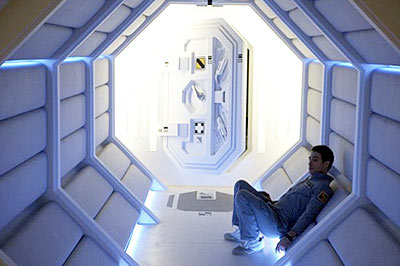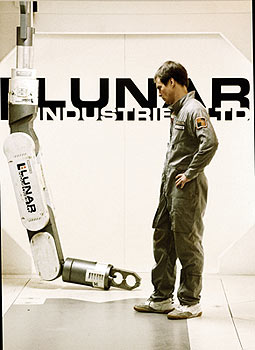Moon: Does Sam Bell Dream Of Electric Sheep?
Published on September 29th, 2009 in: Current Faves, Halloween, Horror, Issues, Movie Reviews, Movies, Reviews, Science Fiction |By Christian Lipski
SPOILER ALERT: I saw the movie, and am going to refer to specific things that happen in it. If you are looking for an article that will let you know if you should go see this film, here it is:
Yes. Go see it.
The rest of this article will be about my impressions of the movie and its major topics.

Any movie, any work of art, will contain traces of its influences. It’s unavoidable, but that is how it should be. One of the questions you ask yourself when experiencing art is, “What were the predecessors of this work?” Recognizing influences helps to understand the motivation behind the piece. In Duncan Jones’ first film, the images presented in the trailer seemed to indicate that 2001: A Space Odyssey would be an obvious touchstone: sparse white sets, a computer/robot with an all-too-innocent “face,” a sense of isolation. Most of these hints were misleading, although a phone call from lunar worker Sam Bell to his family closely echoes Dr. Heywood Floyd’s call to his daughter in the 1968 film. The GERTY 3000’s cartoon icon and calm Kevin Spacey voice are certainly meant to pull you towards suspicion of the computer, but it’s clever subterfuge.
Director Jones has cited Silent Running as an influence, but its presence is minimal in Moon: a man alone and far from home, working on his own with robot assistance, yes. An uncaring authority making greedy decisions, yes, but these are also motifs in Alien, and perhaps have less of an presence in Moon. I’d also pull in Solaris as an influence, as a man’s isolation results in confusion and uncertainty about himself. But the movie I see most strongly is 1982’s Blade Runner (as well as its source novel, Dick’s Do Androids Dream Of Electric Sheep?) and its philosophical question about what it means to qualify as human.
In Blade Runner, Detective Rick Deckard is assigned to track down and destroy worker androids that have escaped into society. What makes these “skin jobs” different from Robbie the Robot is that they have been implanted with memories from humans, and consider these recollections to be their own. They have developed emotions, along with a perceived history, and as such they desperately want to keep on “living.” The question brought up is simply, “What makes a human human?” If I was created with memories, feelings, and a survival instinct, how am I then different from someone who was organically born with these things? The true nature of Deckard is also brought into question, making the audience wonder if the hunter is no different from the hunted.

In Moon, Sam Bell suffers from hallucinations, and after an accident that should have been fatal, encounters himself still at the accident site. The period in which the two Bells share the lunar station without knowing what is going on is a delight. There’s a sense of uncertainty that makes even the viewer wonder what is real and what is not. Both men remember their wife and daughter on Earth, both know that they are working a three-year shift mining Helium-3. Each is convinced that he is the “real” Sam, and is continually frustrated when the other refuses to accept that. Eventually, they learn that they are both clones of the first Sam Bell, and that their employer, Lunar Industries, has been destroying clones at the end of each three-year “mission” and activating new ones with the story that they had been in an accident. So it’s not until far into the film that it is revealed that the protagonist we’ve been identifying with is not. . . human? But what is human?
Sam Bell is in love with his wife Tess and misses her terribly. He works on a model of his home town in his spare time. Suddenly he is transformed into a disposable work unit, merely a resource to be used up in the production of capital, just as Blade Runner‘s replicants are disposed of after their four-year lifespan. Are Bell’s memories less valid because they were implanted? Are his vivid memories less valuable than a “real” human’s foggy recollections of near-forgotten events?
Blade Runner‘s replicants and Moon‘s Sam Bells are each manufactured beings endowed with artificial pasts which allow them to function as humans. Does their origin in a laboratory automatically invalidate their status? We humans are man-made, after a fashion, but there seems to be some “magic” in our creation that bestows upon us our birthright. However, as 2001 author Arthur C. Clarke said, “Any sufficiently advanced technology is indistinguishable from magic,” which then results in the birth of a Roy Batty or a Sam Bell. Moon‘s stance on this question is offered by one of the Bells: “We’re not programmed; we’re people.” Jones seems to agree, as he allows his clones to engineer an escape for one of them, in some kind of happy ending.
Moon proposes some interesting questions about how far corporations should go in order to fulfill man’s needs, and Sam Rockwell shines in his roles as two men who just want to go to the home they remember. It also challenges us to reevaluate what we mean when we say “human.”
Time limit is exhausted. Please reload the CAPTCHA.